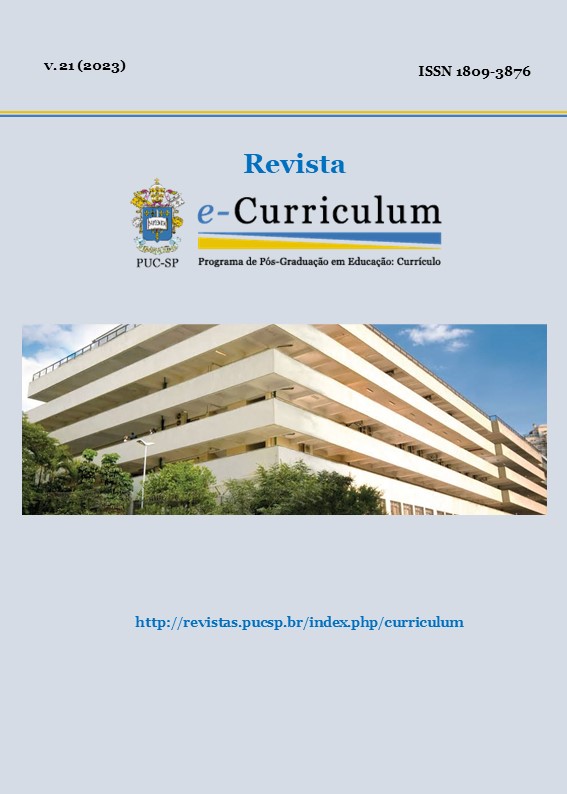O Espectro TPACK na Interação de Cursos Superiores a Distância
DOI:
https://doi.org/10.23925/1809-3876.2023v21e55515Palavras-chave:
ensino superior; educação a distância; webconferência; TPACK.Resumo
Na educação a distância, a mediação pedagógica ocorre por meio de diversas tecnologias. Nesse contexto, as lives apresentam-se como um recurso que possibilita a melhor simulação de uma situação dialógica semelhante à da sala de aula. Com base na experiência da Universidade Virtual do Estado de São Paulo, este trabalho propõe compreender a relação entre a expectativa dos alunos com as ofertas das lives e as estratégias dos facilitadores para tornar essa ferramenta relevante no processo de aprendizagem. A partir dos dados obtidos analisados quantitativamente, notou-se a necessidade da combinação de práticas, ação pedagógica e uso das tecnologias mais adequadas considerando o conteúdo e o conhecimento que se quer construir, corroborando a adoção do paradigma TPACK.
Referências
CRESWELL, John W. Projeto de pesquisa: métodos qualitativo, quantitativo e misto. 3. ed. Porto Alegre: Artmed, 2010.
DOTTA, Silvia; BRAGA, Juliana; PIMENTEL, Edson. Condução de aulas síncronas em sistemas de webconferência multimodal e multimídia. In: 23.º SIMPÓSIO BRASILEIRO DE INFORMÁTICA E EDUCAÇÃO, 2012, Rio de Janeiro. Anais..., 2012.
FETTERMANN, Joyce Vieira; BENEVENUTI, Clesiane Bindaco; TAMARIZ, Annabell Del Real. Letramentos em processo: lives como um gênero textual acadêmico a partir da pandemia da Covid-19. XIV Anais do Evidosol/CILTec, [S. l.], v. 9, n. 1, 2020.
GARBIN, Mônica Cristina. A importância da prática na formação do professor. In: VASCONCELOS, Maria Lúcia M. Carvalho (Org.). Formação e atuação do professor de Língua Portuguesa. São Paulo: LiberArs, 2020. p. 87-103.
GARBIN, Mônica Cristina; OLIVEIRA, Édson Trombeta de. Práticas docentes na educação a distância: um olhar sobre as áreas do conhecimento. Diálogo Educacional, v. 19, n. 60, p. 36-55, 2019. Disponível em: http://dx.doi.org/10.7213/1981-416X.19.060.DS02. Acesso em: 5 nov. 2019.
GARBIN, Mônica Cristina; OLIVEIRA, Édson Trombeta de. Tecnologias, múltiplas linguagens e práticas pedagógicas na formação superior a distância. ETD – Educação Temática Digital, Campinas, v. 23, n. 1, p. 44-63, 2021. Disponível em: https://periodicos.sbu.unicamp.br/ojs/index.php/etd/article/view/8656122. Acesso em: 6 jun. 2021.
KOEHLER, Matthew J.; MISHRA, Punya. What happens when teachers design educational technology? The development of technological pedagogical content knowledge. Journal of Educational Computing Research, v. 32, n. 2, p. 131-152, 2005. Disponível em: https://journals.sagepub.com/doi/10.2190/0EW7-01WB-BKHL-QDYV. Acesso em: 6 jun. 2021.
KOEHLER, Matthew J.; MISHRA, Punya. Introducing TPCK. In: AACTE. Handbook of Technological Pedagogical Content Knowledge (TPCK) for Educators. New York and London: Routledge, 2008. p. 3-30.
MILL, Daniel; ZANOTTO, Maria Angélica do Carmo. Webconferência (II). In: MILL, Daniel (Org.). Dicionário crítico de educação e tecnologias e de educação e a distância. Campinas: Papirus, 2018. p. 687.
OLIVEIRA, Edison Trombeta de; PICONEZ, Stela Conceição Bertholo. Balanço da publicação acadêmica sobre TPACK no Brasil (2008-2015) e suas correlações com os estilos de aprendizagem. In: MIRANDA, Luísa et al. Estilos de aprendizagem e inovações pedagógicas. Santo Tirso: White Books, 2016. p. 105-119.
SHULMAN, Lees. Those who understand: knowledge growth in teaching. Educational Research, v. 15, n. 2, p. 4-14, 1986.
SHULMAN, Lees. Knowledge and teaching: foundations of the new reform. Harvard Educational Review, v. 57, n. 1, p. 1-22, 1987.
Downloads
Publicado
Como Citar
Edição
Seção
Licença
Copyright (c) 2023 Revista e-Curriculum

Este trabalho está licenciado sob uma licença Creative Commons Attribution 4.0 International License. Os autores concedem à revista todos os direitos autorais referentes aos trabalhos publicados. Os conceitos emitidos em artigos assinados são de absoluta e exclusiva responsabilidade de seus autores.
Todo o conteúdo da Revista e-Curriculum é aberto para acesso público, propiciando maior visibilidade, alcance e disseminação dos trabalhos publicados.











